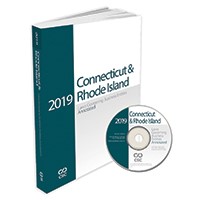Connecticut revises Uniform Arbitration Act
Connecticut legislators signed the Revised Uniform Arbitration Act (RUAA) into law in May 2018. The law applies to agreements to arbitrate made on or after October 1, 2018.
The changes codify arbitration rules, standards, and common practices, some of which had not previously been regulated by statute. The new law permits parties to waive or modify some of the new rules, but protects certain provisions from being waived (or allows waiver only under certain specified circumstances).
The RUAA covers, among other things, arbitrators’ qualifications and their powers, arbitration proceedings and court procedures, both before the completion of an arbitration and after an award has been issued. The new law does not repeal previously-enacted law on arbitration proceedings; instead, it provides that proceedings governed by any other laws related to an agreement to arbitrate (such as the laws governing highway and public works contract arbitrations and new automobile warranties) are still subject to those other laws, unless certain conditions are met.
These and other important changes have been captured in the 2019 Edition of Connecticut & Rhode Island Laws Governing Business Entities Annotated. With up-to-date annotated business entity legislation for Connecticut and Rhode Island, as well as other valuable features that make your legal research faster and more efficient, this all-new publication is a valuable resource for the legal and business communities in the New England area.
The 2019 edition includes over 40 recently amended or added sections in the Connecticut General Statutes, including the RUAA, Omnibus legislation including changes to the state tax law, and Legislation addressing bond caps, changes to certain bond covenants and the functions of certain quasi-governmental agencies. Attorney Nancy A. D. Hancock of Pullman & Comley, LLC has prepared an informative summary of the changes made to the Connecticut business laws.
The latest case notes from state and federal courts interpreting the law have been included for both jurisdictions. A new addition to the deskbook are fee tables showing the Secretary of State’s required filing fees for various business services in both Connecticut and Rhode Island.
The companion CD-ROM contains over 140 forms for incorporation/formation, qualification, mergers, dissolution, and name reservation for all business entity types in Connecticut and the Rhode Island. A listing of the forms and contact information for the jurisdictions can be found in the book’s appendix.
Connecticut and Rhode Island Laws Governing Business Entities Annotated is available as a softbound book or as an ebook, compatible with dedicated e-reader devices, computers, tablets and smartphones that use e-reader software or applications. It is also available on the LexisNexis Digital Library.
| EXERCISE YOUR OPTIONS With CSC®PUBLISHING Autoship: Make sure you’re working with the most current information. Sign up for autoship and receive new editions as soon as they are released, without having to go through the order process all over again. BULK SAVINGS: Discounts on volume orders can save your firm money. To learn more about autoship and bulk purchase options, call 1.800.533.1637. |
To learn more about the 2019 Edition of Connecticut & Rhode Island Laws Governing Business Entities Annotated, call 1.800.533.1637 or visit us online at www.lexisnexis.com/csc
Share this post



